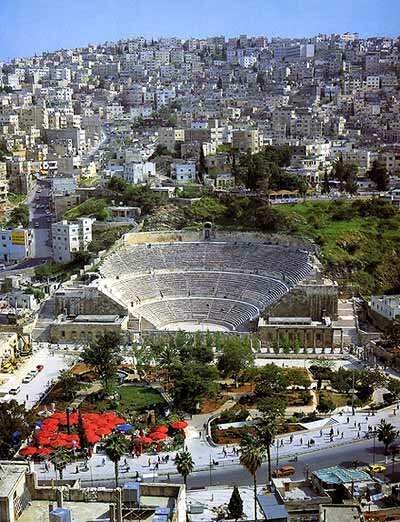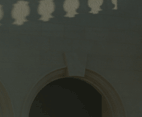| |
The Second International Conference on
Sustainable Architecture and Urban Development
12- 14 July, 2010 Amman, Jordan
|
Organized by:
The Center for the Study of Architecture in the Arab Region, Jordan
In Collaboration with
The University of Dundee, School of Architecture, UK, and
Ministry of Public Works and Housing, Jordan
|
SAUD 2010 Conference is held under the auspices of CIB, iiSBE and UNEP
|
 |
Keynote Speakers:
Dr Raymond J Cole, Professor, School of Architecture and Landscape Architecture, University of British Columbia, Canada
Introduction
The increasing urbanization of many parts of the world coupled with other globally critical issues such as environmental pollution, energy consumption, and resources shortage are resulting in major urban crises in many parts of the world. A strong emphasis nowadays is placed upon improving the sustainability of the built environment "from cradle to cradle". This is attributed to the growing public awareness of the importance of "sustainable development" practices, which also enhances quality of life. Public governance and the construction industry are confronted by the push for sustainability. A fresh and holistic approach to designing, constructing and managing the built environment addressing building and the spatial environment is required, which will need to address buildings and he entire spatial environment. New sets of regulatory practices, indicators, measurements, and priorities are emerging with application at all scales - from individual buildings to the district and city-scale level.
Building on the successful international conference Sustainable Architecture and Urban Development held in Tripoli, Libya in 2009 and in order to explore and map the challenges and opportunities of sustainable development within the urban environment, The Center for the Study of Architecture in the Arab Region (CSAAR) and Ministry of Public Works and Housing, Jordan and the University of Dundee, School of Architecture, UK have joined together to organize the second edition for the international conference on Sustainable Architecture and Urban Development (SAUD ’10).
The conference aims to address the various aspects of urban development considering the implications of applying the principles of sustainability. Of particular interest for the conference is sustainability in the Arab world cities. These cities are undergoing one of the fastest rates of development in the world. However, this rapid, often erratic, and sometimes traumatic growth has not occurred without unwanted consequences in the built environment.
The theme of the conference is "Sustainable Architecture and Urban Development". It aims to provide a forum to examine and discuss solution-oriented, practical methods for implementing sustainable development, and to stimulate more ideas and useful insights regarding architecture and urban development within the context of sustainability. The conference welcomes papers that address issues related to best practice of sustainability in urban design, planning and development in the Arab region and elsewhere. In the interest of tackling these issues from multiple perspectives as well as disciplinary, we invite a wide array of research approaches, ranging from critical-theoretical interrogations to experimental-empirical studies that would encompass not only the spatial and physical aspects of the built environment, but also the social, economic, legislative, cultural and ecological contexts and consequences. The event will feature international prominent Key Speakers, Academic Sessions, Roundtable Discussions and other interactive discussions, to ensure that all participants will greatly benefit from this conference and its international format.
Conference Theme and Research Tracks
We invite participants to submit papers in all areas related to sustainable development, and particularly scholarly work focusing on bridging the gap between theory and practice. The conference welcomes papers from participants from different backgrounds, disciplines and countries. Papers may reflect on a wide spectrum of issues and explore a wide range of solutions. The conference has five research tracks as below. We invite world wide scholars, architects, planners, policy-makers, engineers, real estate decision makers, educators, and researchers and their counterparts in the environmental design and construction fields to share heir experiences and to submit a paper in any of the topics listed under the theme tracks.
Urban Planning & Urban Design for Sustainability
• Urban sustainability and the move to low carbon development
• Integrating of Renewable Energy Sources for Urban development
• Eco-Design and Eco-Friendly Development
• Eco-System and Biodiversity
• Transit-Oriented Development: Health and Walkability
• Emergent Urban Patterns
• Retrofitting the Existing City
• Green Development and Construction Systems
• Sustainable Housing and Compact Urban Neighborhoods
• Traditional Neighbourhoods Design/Neotraditional Design
• Eco-Mobility: Sustainability in Transport
• Innovative Waste Management Concepts
• Landscape Architecture, Productive Urban Landscape and Urban Farming
Design for Sustainability
• Low Energy Architecture
• Low Cost Building
• Design with Nature
• Sustainable Construction Materials, Systems & Technologies
• Smart and Bioclimatic Architecture
• Building Envelopes and Innovative Façade Systems
• Sustainable Vernacular Architecture
• Ecological, Social and Cultural Sensitivity
• Sustainable Urban Design
• Sustainable Design and Human Behavior: Changing Lifestyles
• Sustainable Renovation and Restoration
• Adaptive Re-use and Brownfield Development
• Cultural Heritage and Eco-Tourism
• Zero-Carbon & Low Energy Housing and Mixed-use Development
• Green Building (case studies)
Whole Life Urban Sustainability and its Assessment
• Measures, Assessment Theory, Complexity and Uncertainty
• Measuring Sustainability: Assessment and Buildings Performance
• Sustainability Assessment of Cities and Districts; Emphasizing Environmental, Economic and Social Assessment.
• Whole Life Thinking
• Whole life Assessment
• Sustainability Assessment Methods, Process, Applications and Limitations
• Benchmarking Systems and Schemes for Best Practice
• Parameters of Sustainable Urbanism
• Indicators of Sustainability
Governance & Local Planning for Sustainability
• Stakeholders Participation
• Sustainability in Developing Countries
• Need for Change - Implications of Legislation on Local Planning
• Legislative Empowerments for Sustainability
• Economical Viability versus Sustainability
• Accountability in Governance Practices: Impacts on Sustainability
• Governance Structures and Resource Management
• Community Governance
• Social Inclusion, Equity and Design for an Ageing Population
• Planning for Sustainability: local versus national initiatives
• Transferring Good Practice in Sustainable Development: Implication for Governance
• Role of the Third/ or Voluntary Sector in Sustainability
Climate Change Versus Sustainability
• Climate Change Impact on the built environment
• City, Community and Building for Resilience – preparing for the carbon and climate crunch
• Sustainability Opportunities and challenges
• Theory and Principles of Eco-City, Philosophy in Practice
• Energy Use and Management
• International Organizations, Initiatives, and Standards on Sustainability
Important Dates
| Full paper submission for review |
February 05, 2010 |
| Notification of acceptance |
March 20, 2010 |
| Deadline for final papers |
May 01, 2010 |
Submission Guidelines
Abstract submissions should be approximately 600 words and must be in English. Full paper submission could be either in English or Arabic. Abstract and full paper submissions should be sent in MS Word or PDF format. Abstracts should be e-mailed to scientific committee co-chair (). Full paper submissions are required to be done online through csaar's submission and review system below.
Full Paper Submission
Conference Fees and Registration
Participants wishing to attend the Conference are encouraged to register in advance and as early as possible in order to benefit from lower registration fees. Please note that access to conference activities, Dinner Reception and presentations might become subject to availability in case of late registration.
Authors are invited to complete the registration process before March 30, 2010. Authors should pay registration fees before May 01, 2010. Failing to send the registration fees on or before this date will result in excluding the paper from the proceedings. Click here for online registration>>.
Conference Proceedings
All papers accepted for publication will be published in a conference proceedings, which will be available to delegates at the time of registration. In addition, papers will be published in a volume of CSAAR Transactions on the Built Environment (ISSN 1992-7320).
Journal Publication
A selection of outstanding papers will be published in one of the following peer reviewed print journals:
a. Journal of Green Building, USA
b. Journal Intelligent Buildings International, UK
However, authors must comply with the guidelines of the respective journal and revise the paper as per comments of the reviewers and editorial board of the respective journal. It is guaranteed that all accepted papers will be published within six months subject to compliance to above requirements.
Best Paper Award (3 Awards)
The Best Paper Award is presented to the individual(s) judged by a separate awards committee to have written the best paper appearing in the conference proceedings. The Award shall be 300 USD and a certificate. In case there are more than one author for the paper, the award shall be divided equally among all authors and each shall receive a certificate. Judging shall be on the bases of general quality, originality, subject matter, and timeliness. Up to 3 Best Paper Awards will be presented, one of them if the Best Student Paper Awards. For a paper to be qualify for the Best Student Paper award, a student must be the lead author.
Location & Accommodation
|
Amman is the capital city of the Hashemite Kingdom of Jordan, a city of 2,125,400 inhabitants (2005 estimate), and the administrative capital and commercial center of Jordan.
Amman, the modern and ancient capital of Jordan, is one of the oldest continuously inhabited cities in the World. Amman is located in a hilly area of north-western Jordan. The city was originally built on seven hills, but it now spans over an area of nineteen hills (each known as a jabal or "mountain"). The main areas of Amman gain their names from the hills and mountains on whose slopes they lie. The seven hills of Amman are an enchanting mixture of ancient and modern. In the commercial heart of the city, ultra-modern buildings, hotels, smart restaurants, art galleries and boutiques rub shoulders comfortably with traditional coffee shops and tiny artisans' workshops. Everywhere there is evidence of the city’s much older past. Sunset is perhaps the best time to enjoy Amman, as the white buildings of the city seem to glow in the fading warmth of the day.
Information regarding conference venue, accommodation and travel information is coming soon
|
 |
Excursion
For those who might be interested to extend their stay in Jordan to discover the undisclosed corners of the country, we strongly recommend the post-conference excursions.
Post conference excursions will be announced soon.
Conference Coordinator
Mohammed AlTa’ani, JRES, Jordan
Conference Secretary
Samer Taweel, CSAAR, Jordan
samer @ csaar-center.org
|





